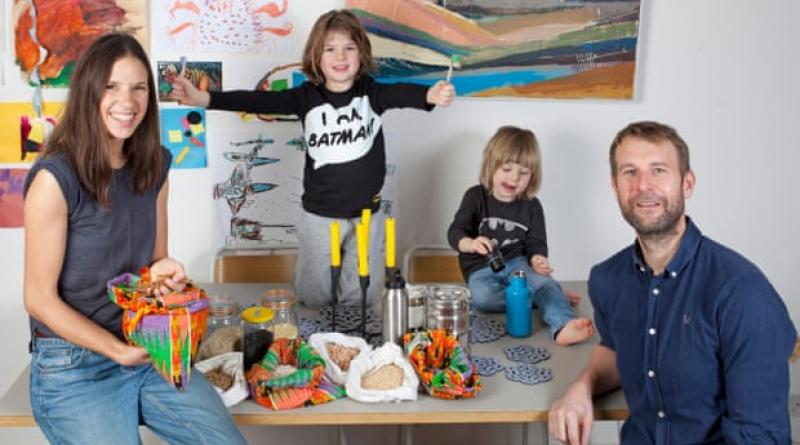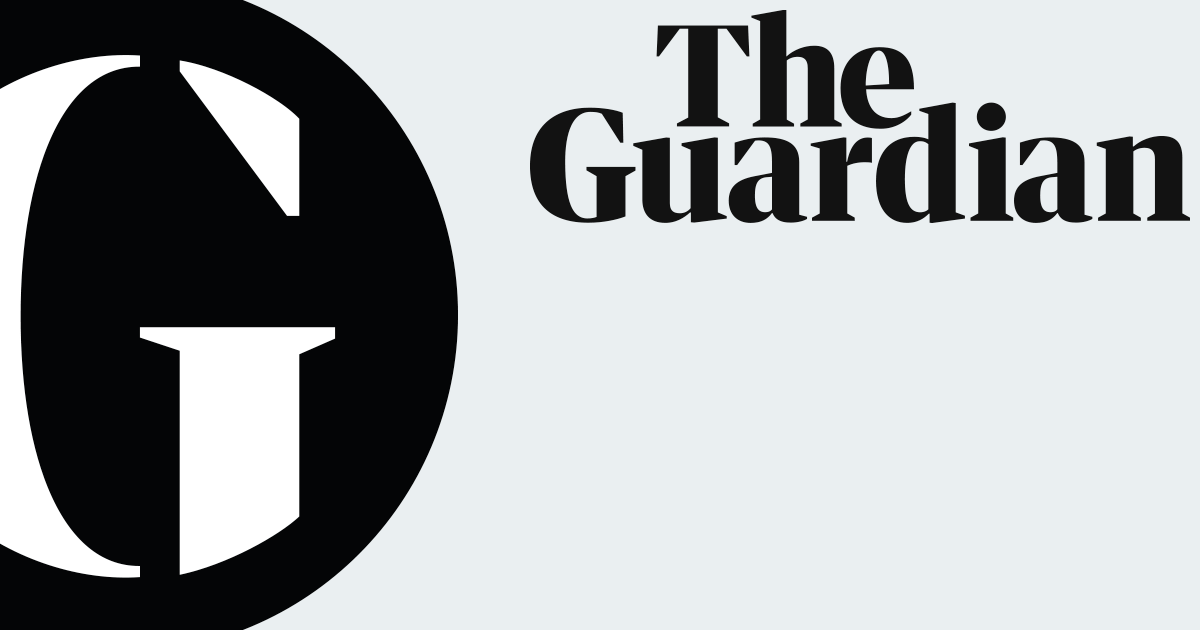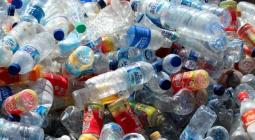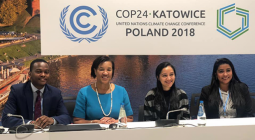Life without plastic: pioneer families show how it’s done

Carrier bags are easy to replace and milk can come in glass bottles. But what about deodorant, toothbrushes and clingfilm?
Bettina Maidment hasn’t emptied the kitchen bin since the beginning of November. The time before that was in August. “You can reduce your rubbish a lot,” she insists, pointing to her recycling and food compost bins. “I have two kids and they’re pretty anti-plastic – I am their mother after all – but it is do-able.”
Maidment, 38, is the founder of Plastic Free Hackney, a campaign to rid the east London borough of single-use plastic and has been serious about committing her family to plastic-free, zero-waste living for two years now. First to go was milk cartons. “That was an easy switch, we got a milkman.”
Then came bamboo toothbrushes, swapping out supermarket shopping for the local greengrocer, and making deodorant, cleanser, moisturiser and handsoap at home. She opens her fridge to reveal shelves of glass jars and reusable containers; her larder is stocked with lentils, pasta, porridge and the like, bought in bulk and stored in glass or canvas bags.
“At the moment, there are all these headlines about sales in shops being down, but maybe everyone has enough stuff.”
Her aim, she says, is to instil the principle in her sons, who are three and six, “that they can be happy with as little as possible”.
She is not alone. As public anger grows over the environmental impact of single-use plastic, trying to live plastic-free and more sustainably has become a mainstream concept. “There was a huge uptick in the conversation after Blue Planet about how to reduce plastic use and it remains, by quite a margin, the single biggest topic area people call us for,” says Julian Kirby, lead campaigner on plastics at Friends of the Earth. “In my experience, the amount of public concern for this environmental issue is unprecedented,” he says. “It’s been phenomenal.”
Maidment admits that her gradual awareness of the amount of plastic and litter in the street has become an obsession. Now, everything that can be is reused, recycled, bought on eBay or sourced from a charity shop. The family have had their second “buy nothing new” Christmas. Maidment’s husband works as an engineer in sustainable design but she didn’t tell him about her project at the beginning.
“My interest was piqued online and I saw how other people were doing it and slowly started reducing my waste.” She opened an Instagram account to document the process of going plastic-free. “It was very much a secret at first – I thought people would think I was mad – but I couldn’t reconcile the idea that so much of what we buy is designed to be thrown away. It’s insanity.”
For Kiran Harrison, 43, who works as a massage therapist and storyteller in Worthing, West Sussex.the impetus to go plastic-free came around the time her son, now nine months, was born. She visited her local cloth nappy library, where parents can loan reusable nappies, and gradually began swapping out the plastics in her home. “Nappies are the number one offender,” she says. “And cloth nappies are so much easier than people realise.”
Harrison says she has “always lived consciously” but began thinking about the environment more after becoming fed up by the waste of supermarket food packaging. “For me, it’s about moving towards an existence that is as kind to the environment as possible,” she says. “I am concerned about the world my son and granddaughter are growing up in, it’s important to me that I am an example of how to live.”
Like Maidment, Harrison makes her own moisturiser. Toothpaste and deodorant come from a jar but she can’t face giving up her shampoo just yet. “I’m Asian and have thick hair – I really love my hair!” She laughs. “But it’s not about feeling bad about what you’re not doing, it’s about feeling good about what you do do.” Support from a fast-growing zero-waste community in Sussex has also helped; a plastic-free, zero-waste food store has recently arrived in Worthing.
“Some people are cynical about how you can sustain a lifestyle like this,” she admits, “or cynical about making a small contribution when big companies produce so much waste, but I’m not down with the ‘what’s the point of doing anything, we’re all doomed’ brigade – it’s far too apathetic for my liking.”
Harrison’s top tip is to “do things gradually so they become a habit. Trying to do everything at once is overwhelming.”
Friends of the Earth, which established a UK network in 1970, launched its#plasticfreefriday campaign in February. “There have been millions of page impressions on that hashtag on Twitter and Instagram,” says Kirby. More than 11,000 people have pledged to join the campaign on Friends of the Earth’s website.
Last week the government launched a consultation to double the charge on plastic bags to 10p while Damian Hinds, the education secretary, called on schools to go plastic-free by 2022. According to a UN report published in June, the proportion of plastic waste that has never been recycled stands at 90.5% – a figure so alarming that it was declared the winning international statistic of 2018 by the Royal Statistical Society.
Waleed Akhtar, an actor from London, says: “The idea that the 150 or whatever toothbrushes I’ve used in my life will still be on this earth 400 years after I’ve gone is horrible to me.” In his profession, he says it takes “a high level of organisation going out on tour that you don’t always have, but when you start with plastic, you start thinking more about our disposable culture in general and become more mindful”.
Akhtar uses beeswax wraps rather than clingfilm for his sandwiches and carries a reusable water bottle, bamboo cutlery, Tupperware and a reusable bag everywhere he goes.“We need to get away from the idea that going plastic-free is sort of seen as a bougie, white, middle-class aspiration,” he says. “I used to drink bottled water every day, but I did a play called Fracked!, and a monologue in it about the impact of water bottles on the environment kicked it all off for me.”
Applying a plastic-free philosophy can, he admits, be challenging in shared accommodation. “I’ve recently moved back home, and getting my mum fully on board is a process. She gets it, and she comes from a culture that isn’t wasteful, but there are so many small decisions to make every day about reducing your damage to the planet.”
THE STEPS YOU CAN TAKE…
Use a reusable water bottle
Plastic bottles remain the second most common single-use plastic polluting the planet – after cigarette butts.
Carry a reusable cup
Most coffee chains offer a discount to customers bringing in their own cups because 99.75% of takeaway coffee cups are not recycled in the UK.
Switch to solid soaps
Liquid shower gels and handwash can be one of the biggest sources of household plastic waste.
Say no to disposable cutlery
The EU plans to ban single-use cutlery, plates, straws, cotton buds, drink stirrers and balloon sticks by 2021.
Brush with bamboo
From hair-brushes to toothbrushes, switch to biodegradable options.
29 December 2018





